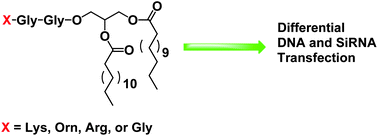Lipid-mediated DNA and siRNA transfection efficiency depends on peptide headgroup†
Abstract
A series of amphiphiles with differing cationic tri- and di-peptide headgroups, designed and synthesized based on lysine (K), ornithine (O), arginine (R), and glycine (G), have been characterized and evaluated for DNA and siRNA delivery. DNA–lipoplexes formed from the tri- and di-lipopeptides possessed lipid : nucleic acid charge ratios of 7 : 1 to 10 : 1, diameters of ∼200 nm to 375 nm, zeta potentials of 23 mV to 41 mV, melting temperatures of 12 °C to 46 °C, and lamellar repeat periods of 6 nm to 8 nm. These lipid–DNA complexes formed supramolecular structures in which DNA is entrapped at the surface between multilamellar liposomal vesicles. Compared to their DNA counterparts, siRNA–lipoplexes formed slightly larger complexes (348 nm to 424 nm) and required higher charge ratios to form stable structures. Additionally, it was observed that lipids with multivalent, tripeptide headgroups (i.e., KGG, OGG, and RGG) were successful at transfecting DNA in vitro, whereas DNA transfection with the dipeptide lipids proved ineffective. Cellular uptake of DNA was more effective with the KGG compared to the KG lipopeptide. In siRNA knockdown experiments, both tri- and di-peptide lipids (i.e., RGG, GGG, KG, OG, RG, GG) showed some efficacy, but total cellular uptake of siRNA complexes was not indicative of knockdown outcomes and suggested that the intracellular fate of lipoplexes may be a factor. Overall, this lipopeptide study expands the library of efficient DNA transfection vectors available for use, introduces new vectors for siRNA delivery, and begins to address the structure–activity relationships which influence delivery and transfection efficacy.


 Please wait while we load your content...
Please wait while we load your content...